Cerebral Palsy
Living & Thriving with Cerebral Palsy
October 6, 2023Written by Katie Martin, Former Schreiber Client
I was born 10 weeks prematurely in 1982, along with my twin brother Adam (who is 14 minutes younger) and was diagnosed with spastic quadriplegic cerebral palsy at 6 months old. Cerebral palsy is a physical condition that affects mobility and posture that for me, was caused by a lack of oxygen and severe brain bleed at birth. I started physical, occupational, and speech-language therapies at Easter Seals (now Schreiber Center for Pediatric Development) shortly after my diagnosis.
In addition to Adam, I also have a younger sister, Laura. Both of my siblings are able-bodied; they do not have special needs. My parents had the same expectations for the three of us; we were expected to work hard and to put forth our best effort with whatever we chose to do. I was not treated any differently as a result of my special needs, which was a gift. Adam, Laura and I have a great relationship. We enjoy spending time together and we give each other a hard time sometimes (like most siblings do). They are supportive of me and vice versa.
For my family and me, Schreiber was a place of hope. Doctors were non-committal about what to expect for my future, while the therapists at Schreiber were determined to help me make the most of my abilities. As a result of my cerebral palsy, I am unable to walk, so therapists taught me to drive an electric wheelchair at the age of four. It was my first taste of independence, being able to move around on my own. I also attended the preschool program at Schreiber as a start to my education. With the support and encouragement of my teachers, Sally Wilbur and Irene Buch, my parents realized that they needed to advocate for me to be mainstreamed in a regular classroom with my typical peers. They did just that and I graduated from Penn Manor High School in 2000 and moved on to receive a degree in Public Relations from Millersville University in 2004.
I always knew that I wanted a career that allowed me to help people with special needs in some way, and joining the Schreiber staff in September of 2007 as the Grant Writer fulfilled that calling. I am honored to be able to work for and give back to an organization that has helped me in many ways. Eleven years ago, I was able to move into my own home and I receive assistance from attendants, who help me with my personal care needs. I have a roommate, my friend, Laura, who I met years ago when we were both Schreiber clients. Along with the support of my family, the support I received from many Schreiber therapists, (including OT, Becky Smith) when I was a client allowed me to realize that even with my special needs, I could lead a productive, fulfilling life.
My diagnosis of cerebral palsy is a part of who I am, but my life is not defined by it. I am a daughter, sister, aunt, friend and camp counselor. I love to spend time with family and friends. I like to do things people do not expect. For example, I “ran” a 5k race with my siblings in 2014, and I got “Believe” and “Hope” tattoos on my arms in 2022. I love to read; Kristin Hannah is my favorite author, and listening to Country, Christian, Pop and Christmas music is my favorite way to relieve stress. I have seen Brad Paisley, Bon Jovi, Darius Rucker, Michael Buble, Rascal Flatts and Zac Brown Band in concert. A perk of needing to use a wheelchair is that it allows you to get great seats at the Giant Center and Hershey Park Stadium. The same thing is true when watching baseball games at Citizens Bank Park (Go Phillies!), Camden Yards (Go Orioles!) and PNC Park in Pittsburgh.
Having special needs can be very stressful. I am stubborn. I do not like asking for help. However, it was important that I learned how to be my own advocate and ask for help when I needed it. Figuring out my attendant care schedule is a constant job that will never end. With that being said, I am extremely thankful for the attendants that help me throughout the day with my activities of daily living, so that I can be as independent as possible. It truly does take a village; I would not be able to do what I do without my support system. I joined a support group for adults who have cerebral palsy last year through Kennedy Krieger Institute in Baltimore, where I have been a patient since 2014. We meet once a month through Zoom, and it is very helpful to connect with people who are going through similar challenges and to get advice.
I am grateful that my job at Schreiber allows me to put my challenges in perspective, so that I can do my best to help the clients who need our services every day. I chose to share my story with you, the Schreiber community, in honor of World Cerebral Palsy Day to illustrate that even though I may have more challenges than other people, I truly believe that having cerebral palsy has helped to shape me into the compassionate, confident, independent, productive, and strong adult that I am today.
If you child has been diagnosed with Cerebral Palsy and you are interested in learning more about how Schreiber’s Pediatric Therapies can help your child visit: http://www.schreiberpediatric.org/therapy-services/
As a nationally recognized pediatric facility, the Schreiber Center for Pediatric Development provides family-centered education and therapy programs for infants, children and adolescents with disabilities, developmental delays, and acquired injuries. Our goal-oriented approach maximizes each child’s ability to function independently within the community.

Sam Leon-Durkee: Young man with a plan
April 19, 2022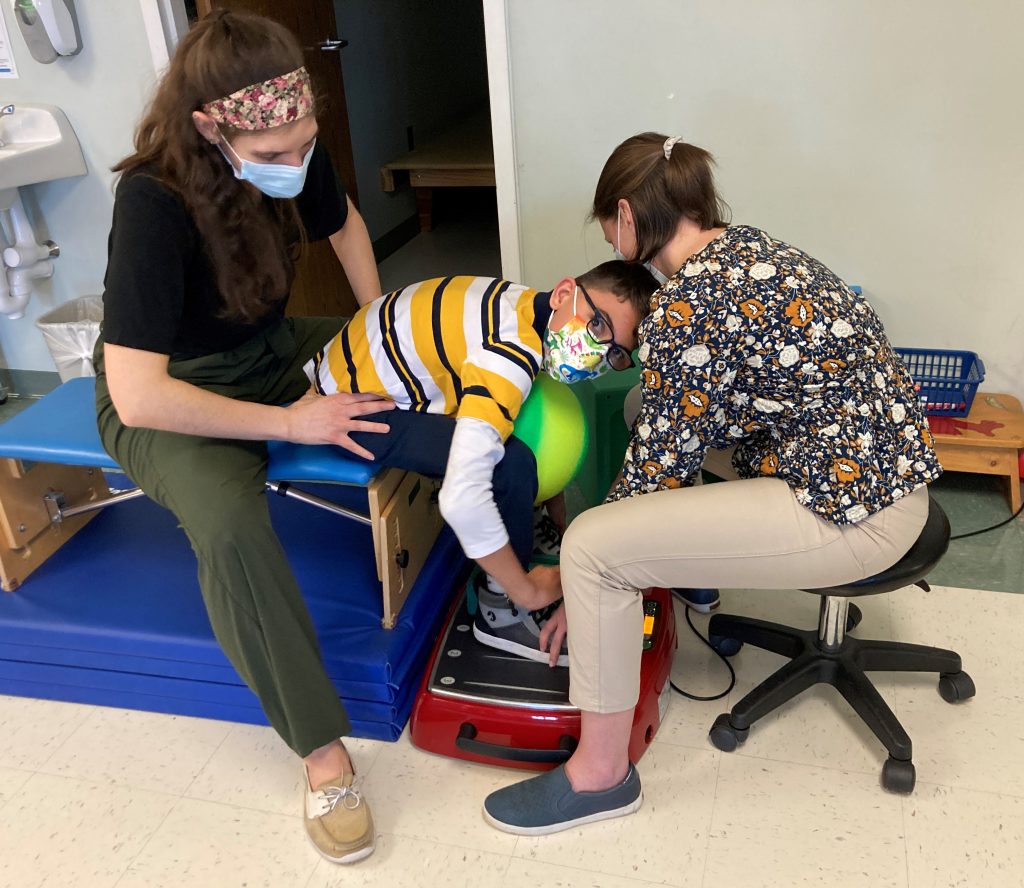
Sam Leon-Durkee started a recent physical therapy session working on a piece of equipment called a Galieleo vibration plate. He sat down on a bench, put his feet on the plate and, with the help of his physical therapist, Rachel Saufley, worked on standing up.
Sam was diagnosed with cerebral palsy at 18 months. He’s 12 now, and does a lot of work to increase his flexibility and mobility. The vibration plate helps reduce the muscle spasticity, or tightness, associated with CP so he can have a more effective therapy session.
Schreiber acquired the vibration plate in December thanks to a grant from the Gamber Foundation. Rachel said she uses it with Sam to help stretch his hamstrings. Sam put it a little differently.
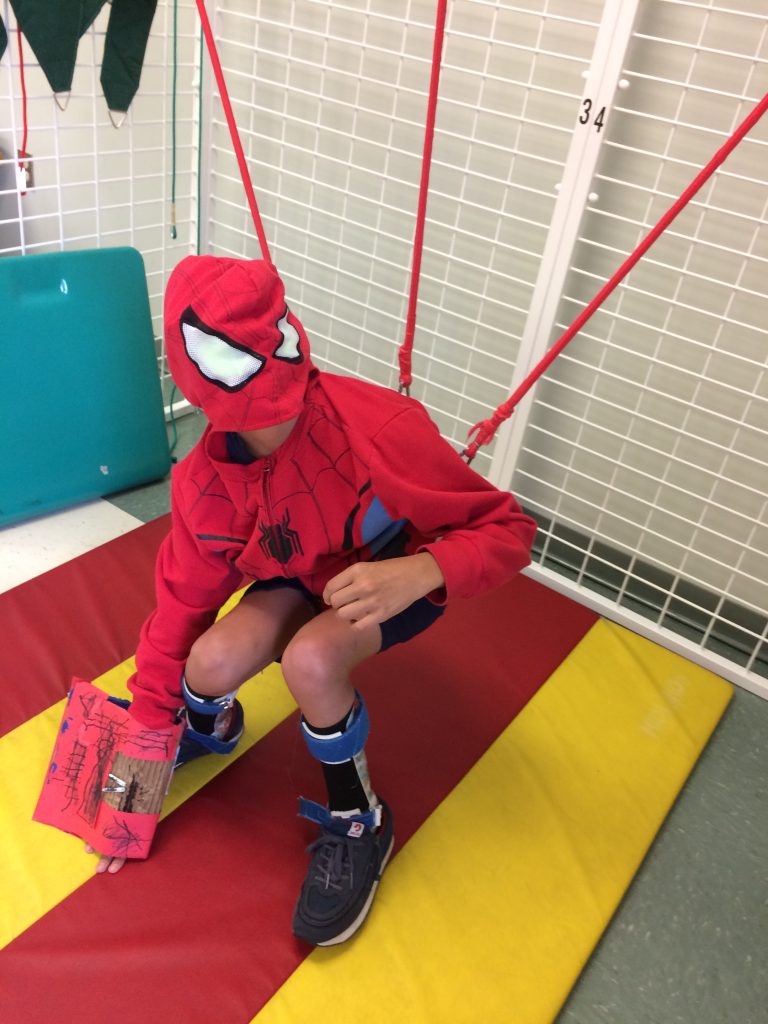
“It’s something new to torture the kids,” he said. “And by torture I mean help.”
He said it like he says a lot of things: with a mischievious smile.
His cerebral palsy makes it hard for him to walk or hold a pencil to write his name. But it has done nothing to hinder his social development.
He’s a talker, a natural storyteller with a vivid imagination and a quick sense of humor. His mom Casey Trone said Sam wants to work at Marvel Comics in New York City.
“I think he’s going to single-handedly write the next Marvel movie,” she said.
That’s the plan right now. For that to happen, there’s still a lot of work to do. Given how far he’s come, though, nobody would bet against it.
Sam was born prematurely in August 2009 and spent five months in the neonatal intensive care unit at Hershey Medical Center. Casey said she started Early Intervention services with Schreiber as soon as she received the diagnosis.
The EI services continued until he was 3. He had a muscle-lengthening surgery at age 4, which helped him make a lot of progress. A year or so later, he returned to Schreiber to resume physical therapy. Around the same time, he started school, first enrolling in Head Start when he was 4 and then starting kindergarten the next year.
“I was a little reluctant,” said Casey, who lives in the Penn Manor School District. “I would have liked to have a little more time for him to develop physically. But he did really well in kindergarten. He’s had an aide with him every year, so the support has been really good.”
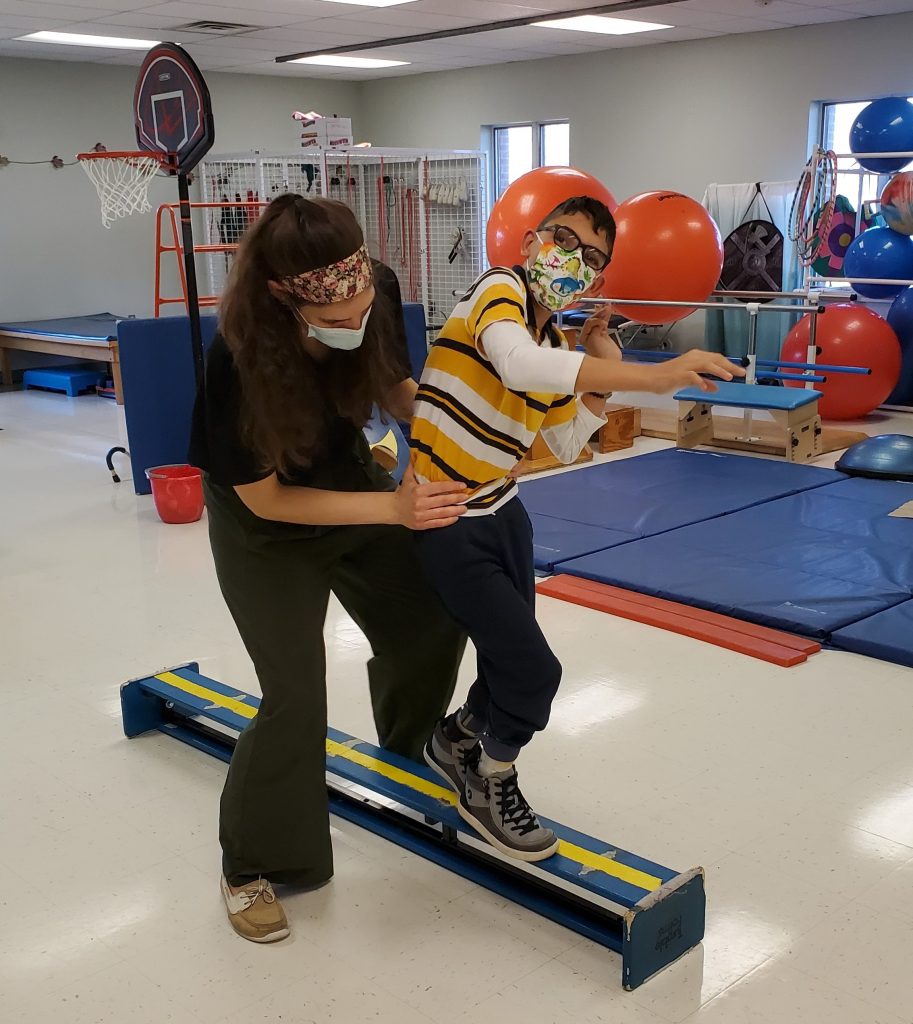
He has continued to do well in school, including his middle school years at Manor Middle School.
“He has shocked me,” Casey said. “I remember when I first got the diagnosis of CP, I had no idea what was going to happen. There are so many different forms of the disease. I went so far as to have weight-loss surgery because I didn’t know whether I was going to be able to take care of him. But he’s doing very well.”
A lot of that she attributes to their experience at Schreiber.
“It’s helped me to understand what is possible and what to do and how to take the next step with him,” she said, her voice cracking and a tear rolling down her face. “My life now is to get him to be the best he can be.”
The physical challenges haven’t been the only ones for Casey, Sam and Sam’s twin sister Isabelle. The twins’ father, Henry Leon-Rivera, passed away in 2016. Two years later, Casey brought Mike Trone into their lives.
“They were just about to turn 8,” Mike said. “When we met the first time, we went out for ice cream. We talked a lot about the ‘Cars’ movies. He’s a smaller guy, and he was even smaller then. But he can talk. He knows what he’s talking about. And he has comedic timing. He’s full of life.”
Now it was Mike’s turn to wrestle with his emotions, and he reached over to grasp Casey’s hand.
“I’ve learned so much from him,” he said finally. “I didn’t know anything about CP when Casey and I met. I guess I had a picture in my mind. And he was nothing like that. Resilience is how he approaches day-to-day life. He’s definitely changed my outlook on the world.”
And now the three-person family is four: Casey and Mike married in 2021. She’s financial coordinator with the Library System of Lancaster County. He’s a Realtor with Keller Williams Keystone. Together, they are rebuilding life as a family. And coming to Schreiber to help Sam become his best self, to fulfill his plans of telling the next stories in the Marvel universe.
“I work really hard every day to give Sam the best life I can,” she said. “And I know he meets me halfway to give his best. We all do what we gotta do, and we’ll get there.”
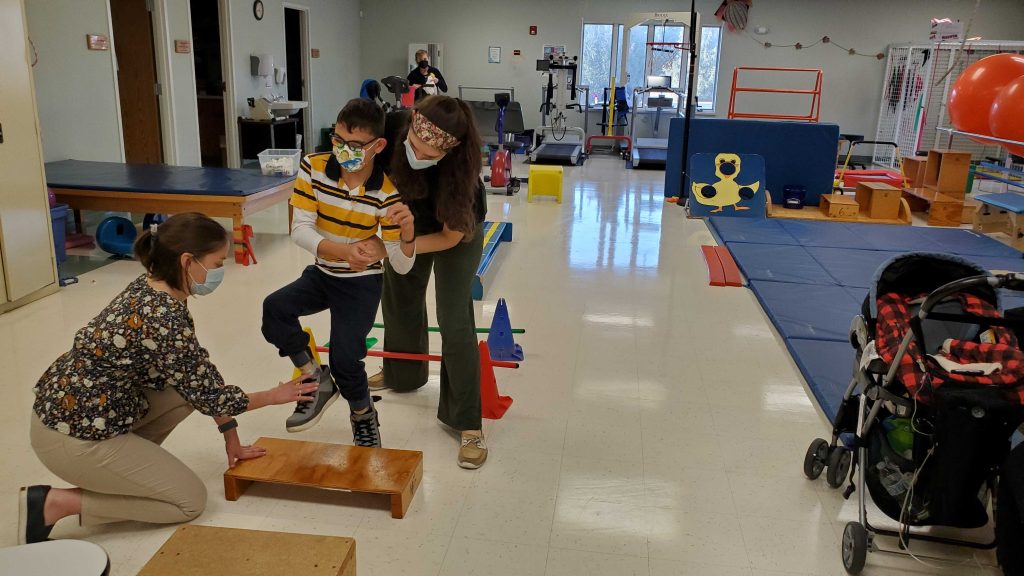
Denisha Roberts: A health care hero
January 29, 2020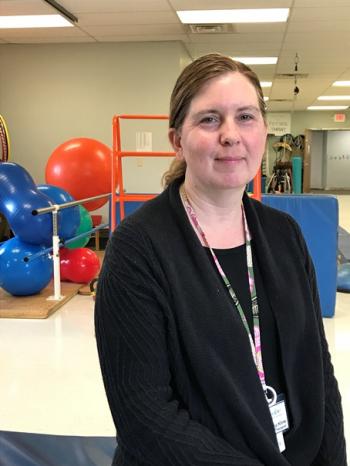
The Central Penn Business Journal recently named more than 30 leaders and organizations as finalists in their 2020 Healthcare Heroes awards, and Schreiber Physical Therapist Denisha Roberts was recognized in the category Therapeutic Care Hero. Here is a testimonial letter from Schreiber parent Jackie Randazzo, whose daughter Grace has been in Denisha’s care since Grace was 2.
Our daughter, Grace, was born in Korea with cerebral palsy. Grace came home to us in 2004 when she was 11 months old. We knew we were adopting a “waiting child,” but we really did not know much about cerebral palsy and what Grace’s disability would mean for her or for us as a family. We received a referral to Schreiber Pediatric and began our journey with Early Intervention and Schreiber. Grace had a few therapists early on and when she was a toddler, then we met Denisha Roberts. We immediately made a connection with Denisha, and she became a strong source of support and a wealth of knowledge.
At first, Denisha came to our home for physical therapy, helping us learn how to adapt our home and support Grace within the home environment. We worked with her to learn what Grace needed to grow to her full potential. Denisha taught us, and helped me personally remember to stand back and let Grace do things for herself. She has helped me learn to empower my child and was not afraid to have the difficult conversations needed to help me do “my work” so Grace could do her work. Denisha always had a way of keeping me hopeful and accountable for our family and for our child.
I have learned so much from Denisha over the years, and we have become a team that is constantly learning to unravel the mystery of Grace and what she needs and, most importantly, how to motivate her.
Denisha was always willing to go above and beyond.
When Grace started horseback riding lessons Denisha was happy to come to the barn to help us learn how to help Grace with riding. On another occasion, Denisha took us to a ball pit so Grace could practice falling and building her protective responses. Over the years, she has gone to amusement parks with us to help Grace have a fun and safe experience. We visited countless playgrounds so Grace could learn to navigate with the other children.
Denisha Roberts is a kind and loving person who is totally dedicated to her work and to helping children. She is completely invested in the families in her care. Denisha is a mother of four, a board member of Brittany’s Hope and a host family for foreign exchange students. I remember a time that Marietta had experienced some flooding, and Denisha called to see if we or any neighbors needed help moving furniture upstairs. She and her four children came to help neighbors. That is just the kind of person she is.
Denisha has become more than a physical therapist to Grace. She has become a part of the family and a trusted friend. When you have a child with special needs it can at times feel lonely and overwhelming. I always knew I had Denisha to help us, and that support has been priceless. She has truly been priceless lifeline and friend for us after all these years. Grace is now 16, and we have known Denisha for more than of 14 years.
We feel truly blessed to know Denisha Roberts.
Jackie Randazzo and her husband Martin live in Marietta.
The Brenneman boys are all Schreiber boys
October 10, 2017Miles eventually received occupational and speech therapy, along with continuing his PT. He was with Jay Graver in preschool for two years, and he was joined the second year by his younger brother Levi.
“Miles was here three times a week for preschool and therapy, Levi was here twice a week,” said Dani, who lives in West Lampeter Township with her husband, David, and the boys. “We were coming every day for that year.”
“When we were looking around for preschools for Miles, I liked the emphasis here on diversity and that there are children of all abilities,” said Dani, who has an associate degree from Harrisburg Area Community College in early childhood education. “I liked it so much I’ve sent all my boys here.”
Well, almost all. The youngest, Asher, is only 4 months old. He comes along when Mom drops off Levi and Isaac, so he’s getting to know Schreiber, too. Even if it’s only as the place where he gets his morning feeding and a nap.
Soon enough, though, Mr. Jay can probably expect to see the fourth Brenneman boy come through.
Summer means camps at Schreiber
May 10, 2017Let’s start with our new camps.
First, we’re offering two handwriting camps. Ready to Write is aimed at younger kids, ages 41/2 to 6 (entering preschool or kindergarten). This camp develops readiness skills for writing with focus on motor and perceptual skills required for writing fluency.
The Write Stuff is for 6-8 year olds (enterting first through third grade) who have already learned letter and number recognition and printing but need some extra practice. Focus is on foundational skills of posture, fine motor control and visual-motor skills.
Both camps will be led by a licensed occupational therapist, and the emphasis will be on fun. All campers will receive their own handwriting kit.
Handwriting camps will run twice a week (Mondays and Wednesdays) for six weeks starting July 10. For more information on times, dates and prices, visit our summer camps page here.
The other new offering will be our Sensory Explorer Camp. This camps will offer young children a broad range of therapeutic activities that involve sensory play and social skills development. It is open to all children of all abilities. Activities will include: water play, arts and crafts, outdoor games, music and nature hikes.
This camp will serve kids ages 4-7, and you can pick from a morning or afternoon session. The Sensory Explorer Camp will run Aug. 7-10. For details, visit the summer camps page here.
And don’t forget about our flagship camp, Camp Schreiber. In its 21st year, Camp Schreiber offers the classic week-long summer camp experience for kids and youth ages 8 to 21. Weekly sessions start June 26 and continue through the week of July 24, including an abbreviated camp week on July 5-6.
Finally, for teens we have our Club 625 Camp, the summertime version of our Club 625 outings. Young people can reconnect with old friends and meet new ones during our camp weeks in the first two weeks of August. This program offers fun on-site activities, as well as opportunities to work on social skills during outings in the community.
To register for any of our camps, visit our registration page here.
AMBUCS rides to the rescue
January 9, 2017This is where AMBUCS comes in. AMBUCS is a national nonprofit “dedicated to creating mobility and independence for people with disabilities,” according to its website.
Most of the work nationally and locally involves helping families obtain Amtryke therapeutic tricycles. And that’s why Howard Livingston and Bruce Schmoyer visited Schreiber Monday morning.
Howard and Bruce are two longtime Lancaster AMBUCS volunteers, and they stopped in to assemble a new bike for Elizabeth Owens and her son, Dorian. They live in New Holland.
Dorian was born with hydrocephalus. While he was still in utero, fluid developed inside his skull. The resulting pressure caused brain damage that left Dorian with ataxic cerebral palsy, seizure disorder and deafness.
He has been coming to Schreiber since he was 2; he’s 16 now. He receives all three therapies here, including physical therapy with Laurie Panther.
She said if a child can propel the bike on their own or if riding helps him or her with their endurance or strength, they are a candidate to receive one of the bikes.
Laurie surprised Dorian with the bike that Howard and Bruce had just finished putting together. His eyes lit up when he saw it.
“This is a big deal for him,” his mom said as Dorian wheeled his new bike through Schreiber’s hallways. “It’s good for his coordination and his core muscle strength. And the biggest thing is the feeling of independence. This will be his bike for him to ride on his own at home.”
Laurie knew Dorian would be excited.
“We ride the bike we have every week here,” she said. “He asks to ride it. It’s his favorite thing to do. Being able to surprise him with it today was pretty cool.”
AMBUCS pays for them. A family or an organization such as Schreiber will put in the request. AMBUCS reviews the request and, if approved, orders the bike from Amtryke.
“We were (buying) about two or three a year up until about a year ago,” Howard said. “The local group decided we needed to ramp it up. We said we could do better. We bought 12 bikes just through our chapter in the past year.”
AMBUCS funds its local bike buying program primarily through an annual art auction, Howard said.
This was the fourth time Laurie has arranged for a family to receive one of the bikes, she said. It doesn’t get old.
“This was a huge deal for me today,” she said. “Most kids like riding a bike. This gives them the ability to ride just like their friends or their brothers and sisters. We’ve had kids go on bike rides with their family for the first time instead of being pulled in a trailer.”
Mom is probably already planning that first family ride with Dorian.
Sophia Robles Finds Hope at Schreiber
June 30, 2016The June Smith Center recommended that the Robles bring Sophia to Schreiber Pediatric for more intense therapy.
At Schreiber, Sophia grew socially, as well as physically.
“When we first came to Schreiber, she wouldn’t go near people,” her mother said. “She would start screaming and wouldn’t leave my side.”
As Sophia became comfortable with the surroundings at the Center, she started to relax and open up. Now she responds with a sweet engaging smile to those who talk with her.
Physical therapy was also a challenge at first.
“I tried to stay with her during the therapy sessions,” Her mother recalled, “but she was resisting and crying out for me, and it was too hard for me to be in there. I had to step out of that situation.”
Malexi began waiting outside the therapy room. When Sophia was alone with the therapist, she started to listen and began making progress. But her limited range of movement presented challenges.
Unusual surgery leads to breakthrough
After evaluating Sophia’s condition, an orthopedic doctor recommended she undergo an operation that would release her tight tendons. It was a surgery that is usually not recommended for children under age 7 because it may need to be repeated later in life. However, in Sophia’s case, a CT scan revealed that her hips were so restricted that they would likely become dislocated if she didn’t have the surgery sooner. So, at the age of 4, Sophia underwent the operation, which required her to be in a cast from the waist down for six weeks.
Before the operation, Sophia’s mother had trouble changing her diaper because she couldn’t bend her legs. After surgery, the cast continued to make diaper changes difficult. But, when the cast was removed, both Malexi and Sophia were overwhelmed by its success.
“I heard her saying ‘open…close’ over and over,” Malexi recalled. “She was laying on the bed, saying ‘open, close’ as she moved her legs back and forth for the first time.”
Sophia started light therapy, which became more intense as her body healed. The therapist was able to teach Malexi how to do the exercises with her at home. With the help of therapy, Sophia increased her mobility, and in one year was walking without the assistance of a walker.
Sophia’s success opened the door to a lot of changes for her and her family. When she came to Schreiber she could barely sit down.
“She was not flexible at all. Her posture was hunched and her legs wouldn’t straighten when she sat down. They were bent when she stood, also,” Malexi said. “Now she is walking, and she can bend down to pick up something from the floor, and she is running. So she has done a complete 360.”
Although she runs with some difficulty, it is a treasure to see Sophia’s joyful strides down the hall outside the physical therapy room at Schreiber. She will continue to improve both physically and socially, and can look forward to a promising future.